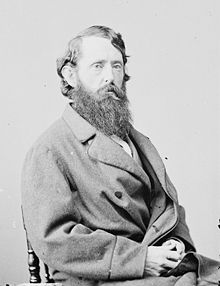| Revision as of 15:26, 15 December 2007 editThe Special Education Squad (talk | contribs)1,142 edits →Early life← Previous edit | Revision as of 04:02, 17 January 2008 edit undoQworty (talk | contribs)13,129 edits also DemNext edit → | ||
| Line 17: | Line 17: | ||
| }} | }} | ||
| '''Benjamin Gratz Brown''' (], ] – ], ]) was a ], ], and the ] ] candidate in the ]. | '''Benjamin Gratz Brown''' (], ] – ], ]) was a ], ], and the ] and ] ] candidate in the ]. | ||
| ==Early life== | ==Early life== | ||
Revision as of 04:02, 17 January 2008
| Benjamin Gratz Brown | |
|---|---|
 | |
| United States Senator from Missouri | |
| In office December 14, 1863 – March 3, 1867 | |
| Preceded by | Robert Wilson |
| Succeeded by | Charles D. Drake |
| Personal details | |
| Political party | Unconditional Unionist |
| Profession | Politician, Lawyer |
Benjamin Gratz Brown (May 28, 1826 – December 13, 1885) was a Senator, Governor of Missouri, and the Liberal Republican and Democratic Party Vice presidential candidate in the election of 1872.
Early life
Brown was born in Lexington, Kentucky, in 1826. He graduated from Transylvania University in Lexington in 1845 and from Yale College in New Haven, Connecticut, in 1847. He studied law, and later settled in St. Louis, Missouri. There he joined his cousin, Francis P. Blair, Jr., and Senator Thomas Hart Benton in a struggle against the pro-slavery faction for control of Missouri's Democratic Party.
He was grandson of John Brown and Jesse Bledsoe.
Political career
Brown became a member of the Missouri House of Representatives and served there between 1852 and 1858. An able lawyer in St. Louis, Brown made a speech in 1857 against a joint resolution opposing emancipation. The speech marked the beginning of the Free Soil movement in Missouri. He was a leader of the movement. After that, he edited the Missouri Democrat between 1854 and 1859. He was an unsuccessful candidate for the Governor of Missouri in 1857.
On August 26, 1856 he fought a duel on Bloody Island (Mississippi River) with Thomas C. Reynolds (then the St. Louis District Attorney) over the slavery issue. Reynolds was not hurt but Brown was shot in the leg and limped for the rest of his life.
Brown became a founding member of the Republican Party in Missouri. Throughout the 1860s, he and Blair contested control of the state's Republican party. He tried to prevent Missouri from seceding from the Union in 1861. After that, he served as an officer in the Union Army during the first half of the Civil War, raising a regiment (the 4th U.S. Reserves) and serving as its colonel. He recruited over 1,100 soldiers for his regiment, many of which were St. Louis-area German-Americans, a key constituency that Brown courted for his political advantage.
Brown resigned from the army after he was elected in late 1863 as an Unconditional Unionist to the U.S. Senate to fill the vacancy caused by the expulsion of Waldo P. Johnson. Brown opposed Abraham Lincoln's moderation and objected to the Emancipation Proclamation because it did not free slaves in Missouri and other loyal border states. He was a key figure in the move to replace Lincoln with John C. Frémont in 1864. He was also a chairman of the Public Buildings and Grounds committee. Following Lincoln's assassination, Brown was vehemently opposed to new President Andrew Johnson's moderate plan of Reconstruction. He also supported the Radical-sponsored Civil Rights Bill and Freedmen's Bureau Bill. Brown left the Senate in 1867 because of ill health.
In 1870, dissatisfied with the Missouri Republicans, he joined the Liberal Republican Party. They nominated Brown for governor. He served as the Governor between 1871 and 1873.
Presidential election of 1872

He was one of the contenders for the Liberal Republican Presidential nomination, but lost to newspaper editor Horace Greeley. Brown was the vice presidential candidate under Greeley in the presidential election of 1872 for the Liberal Republican and Democratic parties. Greeley died on November 30 of illness, before the results came out in the electoral college, and the electoral votes that were to have been for Greeley were split between many candidates. Eighteen of those electoral votes went to Brown. However, the Republicans, incumbent president Ulysses S. Grant and the vice presidential candidate, U.S. Senator Henry Wilson of Massachusetts, won the election.
Brown returned to his law practice, quit the Republican Party and resumed his ties to the Democrats. He died in Kirkwood, Missouri, in 1885.
References
- http://bioguide.congress.gov/scripts/biodisplay.pl?index=B000905
- http://www.sos.mo.gov/archives/education/dueling/political-duels.asp
- United States Congress. "B. Gratz Brown (id: B000905)". Biographical Directory of the United States Congress.
External links
| Preceded byRobert Wilson | U.S. senator (Class 3) from Missouri December 14, 1863 – March 3, 1867 Served alongside: John B. Henderson |
Succeeded byCharles D. Drake |
| Preceded byJoseph W. McClurg | Governor of Missouri 1871 – 1873 |
Succeeded bySilas Woodson |
| Preceded byFrancis Preston Blair, Jr. | Democratic Party vice presidential candidate 1872 (lost) |
Succeeded byThomas A. Hendricks |
| Preceded by(none) | Liberal Republican Party vice presidential candidate 1872 (lost) |
Succeeded by(none) |
